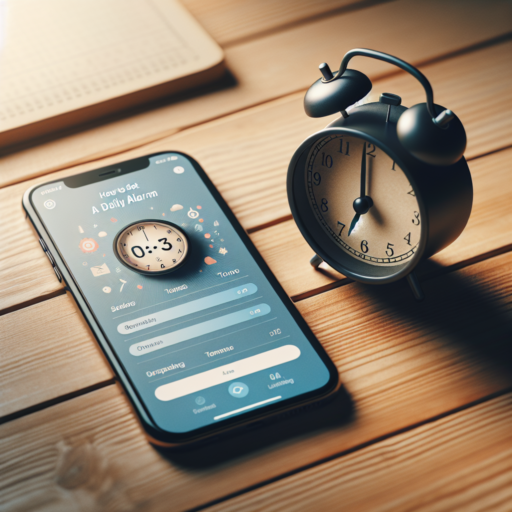Introduction to Setting Daily Alarms
Setting daily alarms has become an essential routine for many individuals aiming to manage their time more effectively. It is not merely about waking up early; setting alarms can play a pivotal role in structuring your day, ensuring you allocate time for all your essential tasks. Whether it’s for reminding you to start your day, nudging you to take breaks, or signaling the end of your workday, mastering the art of setting alarms can significantly enhance your productivity and well-being.
Understanding the basics of setting daily alarms involves more than just choosing a time. It’s about recognizing the rhythm of your day and aligning your alarm settings accordingly. With the myriad of devices and apps available today, personalizing your alarm settings has become more intuitive, allowing for a more tailored approach to managing your time. From selecting pleasant tones that gently wake you up to utilizing alarms that remind you of critical tasks beyond waking up, the options are plentiful.
Optimizing the use of alarms can transform how you approach your day. It’s not just about avoiding late starts but about creating a framework for your day that maximizes productivity and ensures work-life balance. By setting multiple alarms throughout the day for various activities, you can maintain a steady pace, contributing significantly to a more structured and efficient day.
Step-by-Step Guide: How to Set a Daily Alarm on Your Smartphone
Setting a daily alarm on your smartphone is a fundamental but critical task that can help you manage your day effectively. Whether it’s for waking up in the morning, reminding you of an important meeting, or keeping you on schedule with your daily tasks, a reliable alarm can be a game-changer. Thankfully, the process is straightforward and can be accomplished in just a few steps, regardless of whether you’re using an Android or iOS device.
For Android Users
Android users can set a daily alarm by opening the Clock app, which is typically located on the home screen or in the app drawer. Tap on the Alarm tab at the bottom, and then press the + sign to create a new alarm. Choose the exact time for your alarm and then select the days you want the alarm to repeat. Before finalizing, you can also choose a specific ringtone, vibration pattern, and label for your alarm to make it more personalized. Tap on Save
to activate your daily alarm.
For iOS Users
If you’re using an iPhone, the process to set a daily alarm is similarly user-friendly. Start by opening the Clock app on your device. Tap on the Alarm tab at the bottom, then choose the + sign to add a new alarm. Here, you can set the time for your alarm, repeat it for specific days of the week, and even choose a sound that you prefer. Additionally, the option to set a label can help you remember the purpose of the alarm at a glance. Once everything is set, tap Save to ensure your alarm is ready to go.
Both Android and iOS make it simple to adjust or turn off existing alarms, ensuring you always have control over your daily scheduling. Setting a daily alarm on your smartphone not only helps keep you punctual but also assists in managing your time more efficiently. With these steps, you’re well on your way to starting your day right, every day.
No se han encontrado productos.
How to Choose the Best Alarm Tone for Effective Wake Up
Choosing the best alarm tone for an effective wake up is crucial for starting your day on the right note. The key is to find a balance between a tone that is too harsh, jolting you awake and leaving you feeling groggy, and one that is too gentle, risking not waking you up at all. The ideal alarm tone should be something that you find pleasant yet energizing enough to get you out of bed.
Consider the Sound Frequency
When selecting an alarm tone, consider the sound frequency. Scientific studies suggest that humans respond differently to various frequencies. Higher frequencies are generally more effective at waking individuals up because they are more alerting. However, these tones should not be so sharp that they startle you awake, as this can disrupt your natural waking process. Aim for a medium to high frequency that gently pulls you out of sleep.
Personalize Your Alarm Tone
Personalization is key in choosing an effective alarm tone. A sound that invokes a positive emotional response can significantly improve how you feel waking up. Some people prefer the calming sound of nature, like birds chirping or water flowing, which can awaken you in a more serene state. Others might find motivation in waking up to their favorite upbeat song that pumps energy and prepares them mentally to face the day. Experiment with different sounds to discover what works best for you.
Ultimately, the effectiveness of an alarm tone varies from person to person. It’s important to choose a tone that not only wakes you up but also contributes to a positive morning mood. Regularly changing your alarm tone can also prevent desensitization, ensuring that your wake-up call remains effective over time. Remember, the goal is to find a tone that wakes you gently but firmly, making the transition from asleep to awake as smooth as possible.
Utilizing Alarm Apps for Personalized Wake-Up Routines
The modern lifestyle demands efficiency from the moment we wake up, making the role of alarm apps crucial in crafting personalized wake-up routines. Far beyond the traditional alarm clock, these apps offer a plethora of features designed to suit individual preferences and ensure an optimal start to the day. With options ranging from gentle wake-up sounds that mimic the natural sunrise to task-based alarms that require interaction, the right alarm app can transform your morning experience.
Customization at Your Fingertips
One of the standout benefits of alarm apps is the degree of customization they offer. Users can select not only their preferred wake-up times but also choose between a wide variety of sounds, from calming nature melodies to their favorite tunes. Some apps even allow for a gradual increase in volume, ensuring a gentle wake-up. Additionally, many alarm apps enable users to set up multiple alarms for different days of the week, accommodating various schedules and the flexibility that modern life often requires.
Enhancing Wake-Up Efficiency
Alarm apps are designed with features to help overcome the urge to snooze and provide a more engaging start to the day. Many incorporate challenges or tasks that must be completed to turn the alarm off, effectively ensuring that you’re fully awake and mentally active. Whether it’s solving a simple math problem or taking a picture of a pre-registered location in your house, these tasks encourage immediate physical or mental activity, aiding in a quicker and more efficient wake-up routine.
Troubleshooting Common Issues When Setting Daily Alarms
Setting daily alarms can sometimes be more challenging than expected, with a variety of issues that can prevent them from working correctly. Understanding these common problems is crucial for ensuring that your alarms help you manage your day effectively, rather than becoming a source of frustration.
Incorrect Time Settings
One of the most straightforward yet often overlooked issues is setting the alarm for the wrong AM/PM or using a 24-hour clock incorrectly. Checking the time settings carefully can save you from unexpected wake-up times. Ensure that your device’s time zone is also set correctly, especially if you have recently traveled or if your device has updated its software.
Volume and Sound Selection
Another common problem involves the alarm’s volume or sound selection. An alarm that’s too quiet or set to a sound that’s too gentle might not be effective in waking you up. It’s important to test the alarm’s sound and volume before relying on it for your morning routine. Many devices allow you to select from a variety of sounds or even use your music, ensuring that you can find an option that’s loud and pleasant enough to wake you.
In conclusion, while setting up daily alarms might seem straightforward, ensuring they work as expected requires attention to detail. Addressing these common challenges head-on will help streamline your morning routine and avoid any unwanted surprises.
Integrating Daily Alarms into Your Morning Routine for Better Productivity
Setting up daily alarms is not just about waking up on time; it’s about crafting a morning routine that champions productivity and sets the tone for a successful day. The clever integration of alarms into your morning ritual can be a catalyst for establishing consistency, reducing stress, and enhancing your overall productivity. By aligning your waking moments with strategic alarm settings, you create a structured framework that propels you towards accomplishing your day’s objectives efficiently.
Maximize Your Morning Momentum
The initial alarm should serve as a launchpad for your day, but integrating additional alarms can segment your morning into focused phases. Consider setting a series of alarms: the first to wake up, a second to conclude your morning self-care, and another to signal the start of your work or study hours. This segmented approach not only keeps you on track but also builds momentum as you progress through your morning tasks. It’s not merely about the act of waking up; it’s about creating a pace for your day that aligns with your peak productivity times.
Customize Your Alarm Strategy
Different tasks require different levels of energy and engagement. Tailoring your alarms to your personal rhythms can make a significant difference in how you approach your day. For instance, if you’re an early riser, setting an alarm for a morning workout can invigorate your day and enhance mental clarity. Conversely, if your energy peaks in the late morning, consider an alarm to remind you to take a brisk walk or engage in a short meditation session before diving into work. Customization is key to leveraging alarms in a way that boosts your productivity while respecting your natural workflow.
How Technology is Changing the Way We Set Alarms: Smart Alarms and Devices
The evolution of technology has significantly transformed our everyday lives, particularly in how we manage our time and wake-up routines. The traditional alarm clock, which once stood by our bedside with its glaring red digits and jarring buzzer, has been largely supplanted by a new generation of smart alarms and devices. These advanced tools not only wake us up but also enhance the quality of our sleep and overall well-being.
One of the most innovative features of smart alarms is their ability to analyze sleep patterns and determine the optimal time to wake us up within a certain window. This functionality, often referred to as a «smart wake» feature, leverages sleep cycle theory to ensure we wake up feeling refreshed. By monitoring movements and sounds during sleep, these devices can identify light sleep stages, making the wake-up process more natural and less abrupt.
Integration with Smart Home Devices
Furthermore, the integration of alarms with other smart home devices has opened up new possibilities. Imagine your alarm not only waking you up but also gradually increasing the brightness of your bedroom lights, playing your favorite music, or even starting the coffee machine. This interconnectedness creates a seamless morning experience, transitioning you from sleep to wakefulness with personalized ease.
Voice-Controlled Alarms and Scheduling
Voice-controlled assistants, like Amazon’s Alexa or Google Assistant, have also revolutionized the setting and managing of alarms. With simple voice commands, users can set, adjust, or cancel alarms without the need for any physical interaction. This hands-free convenience is particularly appreciated when you’re already cozy in bed and don’t want to reach for your phone or alarm clock. Furthermore, the ability to set alarms based on events or tasks adds another layer of customization, ensuring you’re awoken not just at the right time, but for the right reasons.
Tips for Waking Up Easier With Your Daily Alarm
Waking up in the morning can sometimes feel like a herculean task, especially when the comfort of your bed is so inviting. However, starting your day doesn’t always have to be a battle with the snooze button. By incorporating some practical tips into your morning routine, you can make waking up with your daily alarm a more pleasant experience.
Adjust Your Sleep Environment
Creating an ideal sleeping environment is crucial for easier mornings. Consider investing in comfortable bedding and ensure your room is at a cool, comfortable temperature. Darkness signals to your body that it’s time to rest, so using blackout curtains to minimize external light could also improve the quality of your sleep, making it easier to wake up when your alarm rings.
Stick to a Consistent Sleep Schedule
Our bodies thrive on routine. Going to bed and waking up at the same time every day—even on weekends—can significantly enhance the quality of your sleep. With time, this consistency trains your body’s internal clock, reducing the need for an alarm as your body naturally adjusts to your schedule.
Implement a Pre-sleep Routine
Developing a pre-sleep routine can also aid in better mornings. Engage in relaxing activities such as reading a book or taking a warm bath before bed. Avoid screens and heavy meals before sleep as they can disrupt your body’s natural wind-down process. This preparation helps signal to your body that it’s time to rest, making it easier to wake up feeling refreshed.
Maximizing the Benefits of a Consistent Wake-Up Time
Establishing a consistent wake-up time goes beyond simply avoiding the scramble of hitting the snooze button multiple times. This habitual approach to starting your day can significantly enhance both physical and mental well-being. When your body adjusts to waking up at the same time each day, it sets the stage for improved sleep quality, better mental alertness, and overall happier mood states. Enhancing the benefits of such a routine involves understanding its impact on your body’s internal clock and making small, yet impactful adjustments.
Resetting Your Circadian Rhythm
One of the primary advantages of a consistent wake-up time is the resetting and stabilization of your circadian rhythm. Your body thrives on regularity. By waking up at the same time every day, you assist your internal clock in maintaining a natural cadence, which in turn optimizes your sleep quality and quantity. This alignment can lead to a more effortless wake-up process, a decrease in sleep inertia (that groggy feeling upon waking), and a sharper mind throughout the day.
Incorporating a Morning Routine
Maximizing the benefits of a consistent wake-up time isn’t just about the time you open your eyes; it’s also about what you do once you’re awake. Establishing a morning routine that includes mindfulness practices like meditation, exercise, or even reading can significantly contribute to mental clarity and emotional stability. This routine not only gives you a purpose to wake up each morning but also energizes your day ahead. Regularly engaging in a morning routine sets a positive tone for the day, thereby increasing productivity and overall happiness.
Conclusion: Mastering the Art of Setting Daily Alarms
In summary, becoming adept at setting daily alarms goes beyond merely avoiding the snooze button. It’s about embracing a ritual that prepares us for a productive day ahead. The trick is to incorporate alarms into our morning routine in a way that aligns with our personal and professional goals. By doing so, we not only ensure punctuality but also cultivate a habit of discipline and self-care.
Strategic selection of alarm tones can have a profound impact on how we wake up. Choosing a sound that is too jarring can start our day on a stressful note, whereas a too gentle tone might not wake us up at all. Finding that perfect balance is key. It’s also worthwhile to consider the power of consistency in setting alarms. Having a fixed wake-up time can significantly improve our sleep quality and energy levels throughout the day.
Variability in our waking times can be beneficial too, especially when it’s reflective of our natural sleep cycles. Leveraging smart alarms that analyze our sleep patterns and wake us up at the optimal time within a certain window can enhance our morning alertness and well-being. As we look to the future, technology will continue to play a pivotal role in how we master the art of setting daily alarms, making it tailor-fit for our individual lifestyles and needs.




